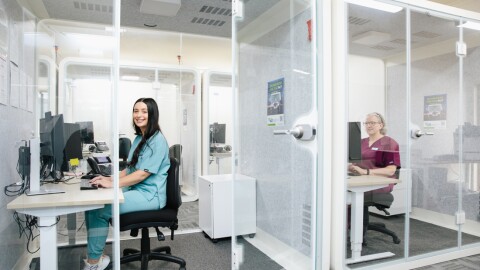The adoption of artificial intelligence (AI) is rapidly accelerating across Australia, with one business every three minutes adopting AI solutions between 2024 and 2025, according to the latest edition of Amazon Web Services’ (AWS) ‘Unlocking Australia’s AI Potential’ report. In total, 1.3 million or 50% of Australian businesses are now regularly using AI, showing a year-on-year growth rate of 16%.
These businesses demonstrate the productivity and economic potential of AI adoption, with 95% reporting an average increase in revenue of 34%. 86% of adopters have already experienced productivity gains, while 94% expect an average of 38% in cost savings.
The report, conducted by independent consultancy, Strand Partners, and commissioned by AWS, reveals that while AI adoption continues to accelerate in Australia, there is a growing gap between startups and large, more mature businesses in the depth of their AI adoption. This AI gap risks creating a two-tier economy in which tech-driven startups innovate more rapidly and outpace their established and less agile competitors.
A two-tier economy emerging
Australian startups, in particular, are enthusiastic and innovative in their use of AI, adopting AI’s most advanced uses far more rapidly than more established companies. 81% of startups in Australia are using AI in some way, of which 42% are building entirely new AI-driven products with AI, leveraging the technology to its full potential.
In contrast, 61% of large enterprises are using AI, but only 18% are delivering new AI products or services, and only 22% have a comprehensive AI strategy.
This gap in innovation risks the emergence of a two-tier economy, where startups are surging ahead of large enterprises in AI integration and adoption. Without deeper integration, these businesses risk missing out on the full potential of AI, falling behind more agile competitors, and driving a two-tier economy that will shape Australia’s prosperity for decades.
Widespread but basic adoption of AI across Australian businesses
While AI adoption is increasing, most Australian businesses are not yet harnessing its most advanced uses, with 58% focused primarily on basic use cases, like driving efficiencies and streamlining processes through chatbots.
Just 17% of Australian businesses are at the intermediate stage of integrating AI across various business functions, and only 24% have reached the most transformative stage of AI integration, where AI is no longer just a tool but a core part of product development, decision-making, and business models, that lead to innovation.
“While it’s encouraging to see a growing number of businesses in Australia innovate with AI and realise revenue, productivity, and cost benefits, our research has uncovered that barriers such as lack of skills and regulatory uncertainty remain, impacting the ability for larger enterprises to deepen their use of AI,” said Michelle Hardie, Head of Professional Services, ANZ, AWS.
“To accelerate Australia’s competitive edge on the global AI stage, it is essential that governments and industry take steps to address these barriers to unlock Australia’s full AI potential. At AWS, we are supporting the broad adoption of AI through our new AI Spring Australia program that is focused on building AI capability and skills across different sectors and industries, including large enterprises, as well as through infrastructure investments and skills training initiatives, including our recent investment of AU$20 billion in Australia.”
Tackling barriers to deeper AI adoption
To accelerate Australia’s competitive edge on the global AI stage, governments and industry must take steps to address the barriers businesses face in unlocking their full AI potential.
A lack of skilled personnel is the leading reason (39%) Australian businesses say is preventing them from adopting or expanding their use of AI. Many reported having the technology and the vision, but are unable to find the people to bring it to life.
This could impact Australia’s global competitiveness and limit economic growth, as 51% of businesses identified AI literacy as being important for future hiring, and only 37% of businesses feel prepared with their workforce’s current skillset. Funding is also a particularly important factor for startups in Australia, with 65% saying access to venture capital is crucial in creating an environment for growth.
A clear, streamlined regulatory landscape is also necessary to give businesses the confidence they need to adopt and invest in emerging technologies. The research found that only 24% of businesses are familiar with the consultation by the Australian government to implement AI regulation and could explain how the legislation would operate.
Those surveyed also estimated they spent 30% of their IT budget on compliance-related costs, such as data privacy and protection compliance, legal consultations, and cybersecurity measures. 73% expect this figure to increase in the next three years.
The path forward for AI innovation
The report uncovered three priority actions to overcome these barriers and unlock the full potential of AI across startups and large enterprises to avoid the emergence of a ‘two-tier’ economy:
- Accelerate private sector digital adoption through skills efforts: A key barrier to AI adoption is not ambition, it's capability. While 91% of businesses view AI-related skills as essential, only 37% feel their workforce is currently prepared. This gap highlights an urgent need for industry-specific digital skills programs, certifications, and practical training pathways to develop a digitally-skilled workforce that can drive AI-led innovation and growth.
- Create a clear picture for Australia’s pro-growth regulation: A regulatory environment that fosters experimentation and provides certainty will be key to enabling AI adoption across all sectors. Ensuring that AI regulation is predictable and innovation-friendly – and maintains a lower-cost compliance model – will be critical to maintaining and strengthening Australia’s position as a global leader in AI-driven growth.
- Modernise public sector technology: 86% of businesses saying they are more likely to adopt AI if the government leads. By using public procurement and prioritising digital transformation in critical areas like healthcare and education, the government can demonstrate the real-world benefits of AI to citizens, build public trust, and stimulate broader demand for innovative solutions.
AWS’s commitment to unlocking Australia’s AI potential
This important research shows that Australia has the ambition, talent, and tools to lead in AI. But it will take bold, coordinated action across government, industry, and education to ensure every business – of all sizes – can benefit from AI’s transformative potential.
In Australia, AWS is committed to realising the ambitions of local customers, partners, and communities, and creating economic opportunities in the country. We reinforced this in June by announcing AWS’s plans to invest AU$20 billion from 2025-2029 to expand Australian data centre infrastructure and strengthen the nation’s AI future.
AWS has also trained 400,000+ people in Australia since 2017 in digital skills, and will continue to support Australia’s current and future workforce through generative AI programs like AWS AI Spring Australia, AWS Generative AI Accelerator, and AWS AI Launchpad. AWS’s various programs are designed to help both individuals – whether students, career changers, or those new to the cloud – as well as businesses, build job-ready skills and pursue opportunities in the digital economy.
With growing concerns about the development of a ‘two-tier’ AI economy, more needs to be done to equip the workforce with the right skills at scale so organisations can innovate and grow in an AI-powered future.
Learn more about the Unlocking Australia’s AI Potential report.














